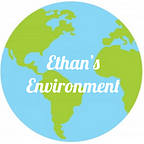Weekly Blog for Classes 1 & 2: Understanding Environmental Issues and Analyzing my Ecological Footprint
As society has progressed exponentially in the recent centuries, the environment has and our use of it has become essential to our livelihood and this growth that has occurred. With factors such as the population growth rate continuing to rise, the value of the environment will only become even more important to the future generations of humans. To gain a better grasp on what the environment truly means to us, we must look at in a different light. To think of the environment as an economy is a good way of doing so as it makes the comparison to something that a majority of the population holds as a very high priority and in a much higher regard than the environment itself. Natural capital is used to describe that bank of natural resources that the Earth currently possesses, such as all living beings, water, and the air we breathe just to name a few. The environment also provides humans with services, which are categorized three different ways, provisioning services, regulating services, and habitat/supporting services. Due to humanity’s boom in growth in the recent past the demand for these resources and services has skyrocketed, making the supply near impossible to maintain and begin to deplete. Now even as someone who does not understand the economy in its entirety, this seems like a rather simple concept as well as one that exhibits the importance of our environment and its resources.
Before addressing the numerous environmental issues our society is facing today, it is essential to identify the roots and causes of them. One of the most important aspects of the environment is its sustainability, which has seemed to garner much greater attention in recent years than ever before. Sustainability is much more than cutting down on these natural resources and services in order for them to be attainable in the future. The natural capital itself is a major component of sustainability and its maintenance for years to come. As alluded to earlier, the growth of humanity has led to more of this capital being used and sustainability to be threatened. Not only that, but factors like wasteful and abusive use of the natural capital’s assets has become more and more of a regular occurence in modern society. Another major factor that stuck out to me personally while reading were conflicting or competing environmental beliefs and ethics. Different regions and countries utilize natural resources in services in different ways based on things like geographical location, population size, or wealth of the citizens and/or government. On that train of thought, it should also be noted that the poor or those living in poverty not only are hit the hardest by environmental issues, but are more prone to incidentally contribute to them as well. Due to the lack of widespread resources that they face, poorer communities have been known to overharvest from food sources or degrade forests and croplands in order to access resources needed to survive. From my interpretation, this seems to act similarly to a positive feedback loop and only further threatens both the environment and those living in poverty.
That is not to say that those who are living comfortably are not also major contributors to environmental issues. For a matter of fact, based on the results of my individual ecological footprint quiz, people like myself are doing quite a bit of damage. My results, which are shown in the two images below, indicate that my carbon footprint specifically is dangerously high as it takes nearly 50% of my entire ecological footprint. I was surprised by how this number was considering the fact that because I currently live in the city, I am not using a car as my main source of transportation, I am actually walking most places, which is environmentally friendly. Most concerning though was the fact that if everyone on Earth lived like me, we would need 4.4 Earths to live sustainably. I would like to think of myself as someone who lives with the environment and its state in mind, but that is not the case for a number of other humans which is frightening to think about.
Word Count: 668
Question: Are the ways to reduce both grazing lands and croplands in order to promote sustainability and sufficiently feed the population? If so, how and can it be done on a large scale?
